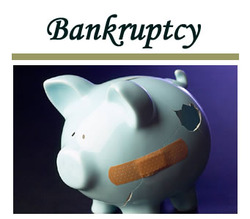 Filing for Bankruptcy can be both a scary and exciting prospect that allows a person deep in debt to make a fresh financial start. However, bankruptcy isn’t always the right answer. Here are a few factors to consider when deciding if declaring bankruptcy is right for you.
Filing for Bankruptcy can be both a scary and exciting prospect that allows a person deep in debt to make a fresh financial start. However, bankruptcy isn’t always the right answer. Here are a few factors to consider when deciding if declaring bankruptcy is right for you.
What type of bankruptcy should I file?
When a person decides to file for bankruptcy, he or she may be able to file two different types of bankruptcy: Chapter 7 or Chapter 13.
A Chapter 7 bankruptcy will liquidate all of a person’s non-exempt assets to pay off their creditors. This type of bankruptcy is a great option when a person has a large amount of unsecured debt such as medical bills and credit card debt. However, there is also secured debts. Secured debts are debts you signed a security agreement for, such as for a home or car. Florida does have some bankruptcy exemptions that may help you protect your secured debts like the homestead exemption. This exemption allows most debtors to keep their primary residence. It is important to note that a person filing for a Chapter 7 bankruptcy can only do so if he or she makes below a certain yearly income. This amount is determined by the Florida Means test.
A Chapter 13 bankruptcy reorganizes a person’s debts, and adjusts the total amount of debt so that a portion of the debt can be repaid through a monthly payment plan. This is a great option if the debtor has a lot of income and wishes to avoid foreclosure on a home. This will also let the debtor keep many assets.
What debts will be forgiven?
Unfortunately, there are some debts that will not be forgiven. Debts that usually will not be forgiven include child support, alimony, tax debts, and student loans. These debts will not be wiped out regardless of whether the debtor files a Chapter 7 or Chapter 13 bankruptcy. For more information on what debts can be erased in Florida, call the Law Office of David Goldman, PLLC today.
Do you have any assets in a pension play or other retirement fund?
Most pension plans and life insurance polices are protected by state bankruptcy exemptions. Retirement and pension plans often include a 401(k) and IRA’s, which are usually held to be exempt in Florida from the bankruptcy trustee. However, there are some retirement plans that may not be exempt.
Make sure your co-signers are not stuck with your debt.
A debtor should review his or her debt agreements to make sure no one else has co-signed for their debts. Once a person declares bankruptcy, the co-signer will be stuck making payments on the agreement. Generally, a Chapter 13 bankruptcy will protect any co-signers to a debt, but a Chapter 7 will not.
For more information on whether bankruptcy is the right decision for you, contact our office today to set up a consultation. The process is relatively easy and the results can of filing for bankruptcy can make a huge difference in your financial life.
 Jacksonville Bankruptcy Lawyer Blog
Jacksonville Bankruptcy Lawyer Blog


